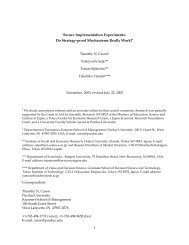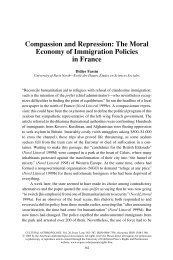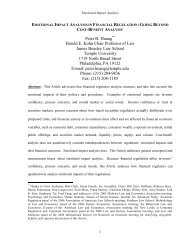Governance, Growth, and Development Decision-making - School of ...
Governance, Growth, and Development Decision-making - School of ...
Governance, Growth, and Development Decision-making - School of ...
Create successful ePaper yourself
Turn your PDF publications into a flip-book with our unique Google optimized e-Paper software.
According to Huntington, social mobilization may be an important<br />
entry point for development in the case <strong>of</strong> “blocked” countries.<br />
A case in point is Ukraine. In the period after 2001, Ukraine suffered<br />
from economic decline, high levels <strong>of</strong> corruption, lack <strong>of</strong> transparency,<br />
<strong>and</strong> what seemed to be an unaccountable political system.<br />
As a result <strong>of</strong> the Orange Revolution in December 2004, the political<br />
system has become much more competitive <strong>and</strong> accountable,<br />
though the country continues to suffer from corruption <strong>and</strong> lack <strong>of</strong><br />
transparency. Ukraine’s economic performance after 2005 has been<br />
stronger than Russia’s, which was moving in the opposite direction<br />
with regard to accountability.<br />
Finally, there may be a set <strong>of</strong> cases where economic growth, not<br />
underpinned by a strong developmental state, but by a state with<br />
“just enough governance,” (Levy <strong>and</strong> Fukuyama 2007) 15 may become<br />
a platform for development in the political <strong>and</strong> social dimensions.<br />
The current governance orthodoxy at the World Bank <strong>and</strong> other<br />
donor agencies is that since good institutions cause growth, institutional<br />
reform should always be an entry point for development.<br />
But Hausmann, Pritchett, <strong>and</strong> Rodrik (2004) 16 suggest that growth<br />
accelerations can <strong>and</strong> have occurred under a wide variety <strong>of</strong> institutional<br />
<strong>and</strong> policy regimes, something borne out by the experience<br />
<strong>of</strong> the period 2003–2007 when virtually every country <strong>and</strong> every<br />
region in the world experienced relatively good growth. Fixing the<br />
problem <strong>of</strong> corruption <strong>and</strong> democratic accountability in a country<br />
like Bangladesh is a daunting task at present. On the other h<strong>and</strong>, it<br />
has had just enough governance to continue to grow impressively; to<br />
the extent that good governance is endogenous to growth it may be<br />
better positioned to reform its institutions in a decade or so when it<br />
reaches a significantly higher level <strong>of</strong> per capita GDP.<br />
15<br />
Levy, Brian <strong>and</strong> Francis Fukuyama, (2008), “<strong>Development</strong> Strategies: Integrating<br />
<strong>Governance</strong> <strong>and</strong> <strong>Growth</strong>”, Washington, DC: mimeo, January<br />
16<br />
Hausmann, Ricardo, Lant Pritchett <strong>and</strong> Dani Rodrik (2004). “<strong>Growth</strong> Accelertions”<br />
National Bureau <strong>of</strong> Economic Research Working Paper Number<br />
10566<br />
Francis Fukuyama 33
















